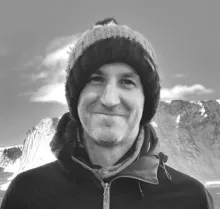
RESEARCH INTERESTS
- the global carbon and freshwater cycles and the dynamics and biogeochemical processes affecting them
- variability of the air-sea flux of carbon and its subsequent accumulation, transport and storage over multiple timescales (from hour-to-hour to multiple centuries)
- extracting the natural and anthropogenic components from the modern signal and how variability in ocean circulation and the oceanic uptake and storage of heat affects these processes
- the ocean as a means to remove carbon dioxide from the atmosphere, whether through alkalinity enhancement or other means
I investigate the above primarily through observations of the inorganic carbon system, dissolved nutrients and oxygen, and carbon and oxygen isotopes, using both discrete and underway seawater analyses, and the deployment of autonomous biogeochemical sensors, samplers, and robotic platforms.
ACTIVE AREAS OF RESEARCH (see projects page)
- the accumulation of natural, contemporary and anthropogenic carbon in the North Atlantic through air-sea fluxes and ocean transports
- the contribution of the Gulf Stream to the the North Atlantic carbon sink and biological carbon pump
- the impact of circulation variability on carbon fluxes
- nutrient transports into the Atlantic, from the Arctic and Southern Oceans
OPPORTUNITIES
We're always looking for good potential PhD students to work on our projects, both those with and without funding already secured, so please get in touch or look at available opportunities.
Also, we currently have a number of open-ended Chemical Oceanography / Marine Biogeochemistry positions within our group, please follow the link to the NOC Careers portal to find out more about the roles and how to apply.
You can also find me at ORCiD and ResearchGate
 |
NOC Chemistry Lead for UK repeat hydrography and contribution to GO-SHIP
Co-organiser of International Summer Schools on Greenhouse Gas Science, held at NOC
PhD Supervisor:
- Clara Douglas (2020 - current) - Not just going with the flow: does biological production rather than deep water formation drive the Southern Ocean carbon sink?
- Pablo Trucco Pignata (2018 - current) - Biogeochemical processes in the eastern Pacific sector of the Southern Ocean
- Charles Turner (Completed 2022) - Characterising water mass and circulation change using heat and carbon covariability during the anthropogenic era
Co-supervisor:
- Chuqing Zhang (U.Southampton, 2023+) - The Southern Ocean carbon sink
- Alice Jensen (SAMS/UHI, 2023+) - Quantifying carbon uptake in the North Atlantic Ocean using Bio-Argo floats
Member of GLODAP Research Group
Member of the NERC Peer Review College
Current projects:
 |
ROCCA - Role of the Overturning Circulation in Carbon Accumulation (2023-2026)
C-Streams - The Gulf Stream control of the North Atlantic carbon sink (2023-2027)
BIOPOLE - Biogeochemical processes and ecosystem function in changing polar systems and their global impacts (2022-2027)
EPOC - Explaining and Predicting the Ocean Conveyor (2022-2027) |
 |
OceanICU - Understanding Ocean Carbon (2023-2028)
CLASS - Climate Linked Atlantic Sector Science (2018-2024)
GO-SHIP & GLODAP - Global Ocean Data Analysis Project (both ongoing) |
 |
RAPID (2004-) |
Previous projects:


